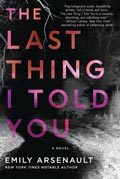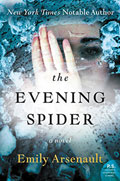NEW YORK TIMES
Marilyn Stasio, 7/20/18
Here’s a tip: Do not trust the narrator! Worth keeping in mind at all times, this friendly warning is especially applicable when reading THE LAST THING I TOLD YOU (Morrow/HarperCollins, paper, $15.99), another shape-shifting psychological mystery by Emily Arsenault, a writer who constantly surprises me. Here she fiddles around with the very concept of the narrative voice by splitting the story between two storytellers. Sgt. Henry Peacher speaks from his official perspective as the homicide detective investigating the murder of Dr. Mark Fabian, a psychotherapist whose head was bashed in by someone wielding a heavy bookend. The other, more intimate voice belongs to Nadine Raines, who became a patient of Dr. Fabian’s because of “what I did to my social studies teacher.” Although we eventually learn what she did to her teacher, we never tire of Nadine’s voice, which seems to hover on the near side of madness: “There was something freeing, something rapturous, even, about that moment when my hand came down and broke through his skin.” Then again, it’s kind of comforting to hear Peacher discussing “Hansel and Gretel” with one of his little girls.
— New York Times review online
____________________
THE WALL STREET JOURNAL
Tom Nolan, 7/26/18
“[Arsenault] displayed impressive abilities and great charm. With this new work—its diverse supporting cast and mix of wry wit and psychological dread—she vaults to an even higher plateau of achievement. Intertwining strands of police-procedural and personal-confessional details set the reader up for one of the most surprising plot twists in recent memory.”
— The Wall Street Journal review online
____________________
PUREWOW
5/7/18
The Best Beach Reads of Summer 2018
From the author of The Evening Spider, a creepy thriller about the murder of a psychologist in a quiet New England town and his former patient, who may or may not be involved.
— PureWow
____________________
BOOKLIST
5/1/18
In her latest thriller, Arsenault (The Evening Spider, 2016) examines what happens after a mass shooting is forgotten by the media, but that’s just one of many layers in a thought-provoking story. The tale starts with the murder of psychologist Mark Fabian, but readers come to find out that his death was actually the culmination of years of turmoil surrounding a massacre at a Massachusetts nursing home. As Arsenault invites readers into the small-town setting, she introduces two characters who were previously Fabian’s patients, as well as the detective, Henry Peacher, investigating the therapist’s murder; Peacher was also the first officer on the scene of the mass shooting. The multiple, intertwined points of view cleverly reveal how a horrific crime isn’t a day in the making, nor is it quick to recover from, and the story will leave readers looking anew at events they thought they had figured out. Readers who enjoy a police procedural with a sturdy lawmaker at the helm are the audience for this slow-burning but thoroughly satisfying mystery.
____________________
PUBLISHERS WEEKLY
July 2018
The bludgeoning murder of therapist Mark Fabian in Campion, Conn., drives this tense-if-flawed blend of police procedural and psychological drama from Arsenault (The Evening Spider). Det. Henry Peacher’s investigation hinges on Fabian’s cryptic notes and two old patient files he pulled just before his death—in particular, that of Nadine Raines, who stabbed a teacher with a box cutter when she and Henry were in high school together in Campion. Years later, Nadine has returned to the small town to visit Fabian. Indeed, she’s present at the crime scene, which she later flees, but is she the killer? Nadine is a richly imagined character, and her notes made as a teenager and internal monologues retrospectively addressing her unresolved issues about adult men feel creepily authentic. But Henry’s pursuit of the explanation for Fabian’s death—and eventually of Nadine—is unevenly paced, plodding at first but too fast as the pieces fall together into an unsatisfying twist ending. Hopefully, Arsenault will return to form next time.
— Publishers Weekly review online
____________________
KIRKUS
5/1/18
A woman who committed a violent act as a teenager returns to her New England hometown—and her former psychiatrist is murdered. In Arsenault’s (The Leaf Reader, 2017, etc.) novel, it’s been almost 20 years since Nadine Raines left town after finishing her high school equivalency degree, but something beyond a holiday visit to her mom and stepfather has brought her back. Could it be the desire to harm her former psychotherapist, Mark Fabian? After all, when Nadine was in high school, she attacked a teacher and then spent several years in therapy with Fabian, whom she nicknamed “Bouffant,” before leaving for college and a nursing career. Sgt. Henry Peacher remembers Nadine from high school; he stayed in Campion and, after a brutal rampage at a local nursing home a few years ago, has earned a reputation as Campion’s hero cop. So when he finds a copy of her old file in Fabian’s office, as well as a copy of the nursing home shooter’s file, he wonders if there is a connection between these isolated incidents of violence. The novel alternates between Henry’s point of view and Nadine’s, with most of Nadine’s internal monologue addressed directly to (dead) Fabian. Meanwhile, Henry fights to discover some dark truths about the town of Campion and its seemingly upstanding citizens, truths that they might kill to conceal. There’s very little about the novel that truly thrills or that feels original, except maybe the forthright Henry Peacher, who is not a hero but is all the more human for it. Nadine remains shadowy throughout, and Fabian, in the end, doesn’t seem to have been a particularly effective therapist—or a particularly intriguing victim.A few interesting character intersections but, overall, a fairly derivative thriller.
— Kirkus review online
____________________
MEGAN MIRANDA
New York Times bestselling author of The Perfect Stranger
The Last Thing I Told You swept me in with its haunting premise and captivating characters. Emily Arsenault weaves a thrilling, layered story that connects past and present, truth and memory. An original, unpredictable tale of psychological suspense.
____________________
WILLIAM LANDAY
New York Times bestselling author of Defending Jacob
Psychologically acute, beautifully written, full of twists and turns, The Last Thing I Told You is a complex, absorbing and satisfying read.
____________________
WENDY CORSI STAUB
New York Times bestselling author of Little Girl Lost and Bone White
Ensnared in an intricate web, Arsenault’s vivid characters seamlessly narrate a suspenseful tale in voices that resonate truth. But is that what they’re telling? If you like a twist-filled page-turner, you’ll love The Last Thing I Told You.
____________________
HALLIE EPHRON
New York Times bestselling author of You’ll Never Know, Dear
A rich, finely-observed, character-driven psychological thriller that creeps up on you, surprising as it unfolds, inevitable in retrospect.
____________________
FRANCIE LIN
Edgar Award-winning author of The Foreigner
The Last Thing I Told You is an expertly woven tale of dark obsession and blood secrets. With her sharp eye and clear prose, Arsenault gives us a finely dissected portrait of a disturbed young woman as well as a tense thriller that defies categorization. Compulsively readable, and highly recommended.









